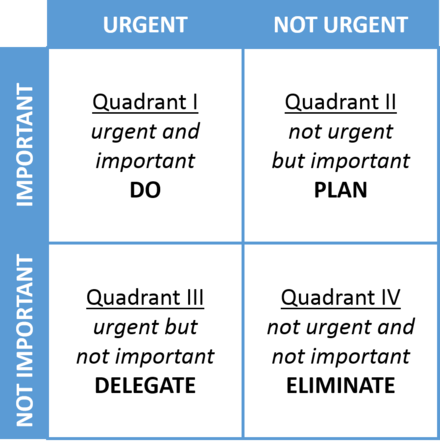Do you:
Find yourself firefighting, and in crisis regularly.
Feel completely drained at the end of the day and yet feel like you have not done anything of significance.
Feel your life is going nowhere.
Feel victimized and pressurized by other people’s expectations, or that other people are taking undue advantage of you.
Read newspapers for more than 10 minutes per day, watch daily soaps on the TV, watch IPL cricket matches - but cannot find time for pursuing your hobby or learning a new skill.
If the answer to most of the above questions is yes, this article is for you. It’s about being effective over being busy. Everyone has the same 24 hours. How then some people are so effective while some always run short of time or are living without direction
The problem is our unclear focus and the resulting inability to prioritize primarily because of our confusion between what is merely urgent and what is really important. We believe that urgent things are always important and important things are always urgent. Soon we will see, it is not so. We often confuse urgency with importance, but the real picture is different. Dwight Eisenhower, 34th President of the US served two terms, and who had earlier served as a five-star general of the US Army said: “What is important is seldom urgent and what is urgent is seldom important."
The reason we confuse urgency with importance is rooted in our evolutionary past. Our ancestors had to focus on immediate issues. Long term strategy was alien to them. If they saw a tiger approaching, they had to run with all their might. They couldn’t afford to think whether the tiger is coming to inquire about the cricket score or whether the beast intends to tear them for its dinner. The urgency had to be sensed as a matter of life or death. Urgencies then were invariably important for life. Those days have passed but the carvings in our genes remain. Real-time social media like Facebook, Whatsapp, BBM etc. have successfully exploited our weakness for urgency.
To clarify what is ‘urgent’ and what is ‘important’ let us go through their meanings.
Urgent: Urgent matters are those which need your immediate attention and action. They either have a visible and looming deadline, or they are sudden emergencies which hit you.
Important: Important tasks contribute to the furtherance of our goals and dreams. They may not always shout with a deadline tag.
THE EISENHOWER URGENT-IMPORTANT MATRIX:
This is one of the simplest yet most profound concepts in time management, propounded by Dwight Eisenhower and later popularized by the great self-help guru Stephen Covey. There are four quadrants formed by the combination of the words important and urgent.
Quadrant 1: Urgent And Important
Quadrant 2: Not Urgent But Important
Quadrant 3: Urgent But Not Important
Quadrant 4: Not Urgent And Not Important
Quadrant 1: Urgent and Important:
Examples:
1. Tax Returns with a looming due date.
2. A crying baby, Household chores, Car break-down.
3. Examinations for unprepared students.
4. Presentation for tomorrow’s board meeting.
5. A loan installment is due immediately.
6. Medical emergencies involving you or your dear ones.
7. Relationship crisis, Financial crisis.
8. Depression, Emotional failures, Intolerable stress.
This is a ‘Just Do It’ Quadrant. The matter of concern here is those which affect you significantly. These tasks have to be tackled immediately. If something shouts from this quadrant the first thing you should be asking yourself is: How the hell did I get into this mess. Why didn't I pay attention earlier?
Majority of the tasks here are a result of our laziness or procrastination. We may call them ‘expected urgencies’ because when we postponed these tasks we knew they can create a crisis situation like the tax returns on a due date. Expected urgencies were under our control but we didn't pay attention to them when we had time on our side.
Some tasks in this quadrant are ‘unexpected urgencies’. They crop up unexpectedly, like a heart attack. Unexpected urgencies too could be avoided or dealt with least damage if proper preventions and precautions are taken.
The result of continuously working in this quadrant is stress, burnout, blame game, excuse making a habit, low morale, compromised ethics, anger, low quality of work, strained relationships etc. This quadrant prevents you from acting proactively. You don’t act on your work, your work acts on you. You become a crisis manager, a person who needs problems and deadlines to bounce from the couch. You lose the trust of people. The scars left by tasks appearing in this quadrant are hard to erase. For e.g., you default on a loan repayment which adversely affects your credit record permanently. Though you survive an avoidable medical emergency, your functioning may be affected permanently.
Quadrant 2: Not Urgent but Important:
Examples:
Effective Activities for Clarity of Thought and Direction:
1. Self-improvement: reading, research, and reflection.
2. Clarifying beliefs and values, realizing your dreams.
3. Setting your goals, priorities, and plans.
4. Effective Activities for Quality:
5. All your New Year resolutions are quadrant 2 activities.
6. Training and learning new relevant skills.
7. Recreation, vacation, excursion, hobbies.
8. Building and nurturing human relationships, networking.
9. Long term projects.
10. Making a difference in the world, activism.
11. Realizing and planning the pursuit of your passion and purpose.
12.Prevention and Precaution: Exercise, health checkups, healthy eating, car maintenance, home maintenance, wearing a helmet or a seat belt, medical, life and general insurance, savings & investments.
Quadrant 2 is a ‘decision facilitator'. It is a quadrant which prepares you for decisions in matters of the head as well as matters of the heart. It is about clarifying your thoughts and engaging in effective activities. As stated earlier our problem is the unclear focus and the resulting inability to prioritize. Prioritizing is being able to ‘decide’ what is really important for you.
The direction is more important than speed. The focus of quadrant 2 is on the end results rather than methods and time efficiency. The focus here is on what is really important versus what is merely urgent. These are important matters which do not wear the urgent tag on their forehead. The activities here are “sow now and reap later” types. It’s a long term investment. These tasks don’t act on us; we have to proactively act on them. There is nobody with a stick chasing us.
This quadrant gives direction and quality to our lives through fulfillment, control, fewer crisis, and lesser regrets.
Quadrant 3: Urgent but not Important:
Examples:
1. Interrupting phone calls.
2. Somebody drops in to say hello.
3. Most emails, messages, or social media notifications.
4. Horizontal delegation by your peers.
5. Requests for work coming from people because you are already involved in quadrant 4 (not urgent and not important) activities.
6. Getting involved in some social activities though it doesn’t align with your purpose.
7. Trying to do things perfectly where ‘good enough’ is perfectly o.k.
8. Some meetings, functions, ceremonies where your presence does not matter either for you or for the other.
9. Greed, ostentatious display.
This is a funny quadrant. We keep doing these tasks thinking that they are important. But, once you start understanding the big difference between urgency and importance you will be surprised that there are number of funny things we go on doing which fit here. They are urgent but not important. If some tasks here seem unavoidable, try and delegate them.
People find themselves saddled in this quadrant because of unclear thoughts and lack of dreams and goals. The natural outcome of this is getting ‘image conscious’ and surrendering to your ‘obsessions and phobias’.
You want to build and preserve a ‘good boy’ image and cannot say no. People’s opinion about you matters a lot to you. Your self-worth is based on the ‘usefulness tag’ others put on you. You are too humble to keep the phone ringing. You are afraid of the other person’s reaction. You cannot deny an invitation because you see it as a validation of your popularity or you see yourself as too unworthy for it. The result is you feel victimized and pressurized by other people’s expectations and a feeling of resentment sets in with people taking undue advantage of your niceness. You expect reciprocation from people whom you oblige and it rarely materializes. You become a crisis manager and man-Friday for many. If this happens to you, your self-esteem and self-confidence need a boost. Your self-worth should come from inside not outside. Quadrant 2 can be of help.
Please understand the difference between a quadrant 3 ‘good boy’ and a quadrant 2 ‘activist’. An activity which aligns with your own purpose of making a positive difference in the world in your own special way is a quadrant 2 activity. A quadrant 2 activity furthers your dreams, goals, and quality of life. Quadrant 3 ‘good boy’ is a chameleon trying to please everyone and ends up displeasing himself.
It is easy to jumble the urgent as important and get involved in Quadrant 3 activities. The reasons might be unclear thoughts, unclear dreams, and goals or obsessions and phobias. For e.g. Aiming perfection where good enough is perfectly fine, cleaning the home for the last corner particle, over possessed by the need for orderliness, too rigid planning, following some Utopian ideologies, spending time on superstitious and dogmatic beliefs, being over cautious etc. A new cell phone or car hits the market and you want to be the first to flaunt it. Trying hard to win the rat race without knowing the purpose of the race. All these are stressful and create urgencies where there are none. Relax, relax think and act.
This is a deception quadrant where you are busy, without doing anything important. In effect, you are running like a headless chicken heading nowhere. People spend most of their time in quadrant 3 thinking that they are activities of quadrant 1.
Quadrant 4: Not Urgent and Not Important:
Examples:
1. Gossip, long telephone conversations, social media like WhatsApp, facebook, twitter, reading junk e-mails etc.
2. Straying: Unconsciously we slide from important tasks to the non-important ones. You may open the internet or newspaper to look for some useful information but end up watching or reading irrelevant stuff. You don’t know where you go.
3. Excessive cigarette or tea breaks, daydreaming, interrupting others
4. Passive entertainment: Mindless TV shows, video games, computer games, watching cricket matches etc.
5. Drumming: Planning without action, attending lectures and sermons without introspection, or learning within your ‘belief walls’. All noise.
This is a dilly-dally feel good quadrant. Not important but impulsive. No compulsion, yet compulsive. It is a quadrant of the escapists. People exhausted after dealing with urgent matters of quadrant 1 and quadrant 3 find solace here. Stress and boredom are big reasons for people to fall helplessly in this quadrant. But this fire and water game cannot go on indefinitely. You cannot escape and hide into this quadrant too long. At some point, the fire will win and consume you from both ends.
The activities have no value for you or for anybody else. You spend the time here just because of your laziness or exhaustion. This is the worst quadrant to be in. This quadrant instills guilt as it is a quadrant of waste. The result is dwindling self-esteem.
Conclusion:
People who spend time almost exclusively in quadrant 3 and quadrant 4 lead irresponsible lives. It is easy to get trapped in these quadrants if you aren’t sure about your dreams and goals. Somewhere, deep down we know how important quadrant 2 is but we lack the awareness of importance it carries. We easily get carried away by the quadrant 3 ‘image’ or quadrant 4 ‘feel good’ and avoid the quadrant 2 ‘simplicity’.
Clarity of thought and direction are utmost important. Climbing a ladder hurriedly only to find that it is leaning against the wrong wall is frustrating. Avoiding quadrant 2 to save time will cost heavily in the long run. We all spend too less time in quadrant 2 because it doesn’t shout with urgency. Statistics suggest that we spend more than 80% of our time in quadrant 3 and 4. Being a pragmatist I agree some time will go to quadrant 3 and 4, let us cap it at 20% to start with. Don’t delude yourself by telling “someday I will work on quadrant 2, for now, let me do the urgent stuff”. This won’t happen and that ‘someday’ won’t come. Urgent stuff is like surf. You get up and it hits you again.
You have enough time. You just need a big “YES” to be able to say a big “NO”. How else can you say no to a popularity activity if there is not a big pull of your dream, how can you stop yourself escaping in a round of computer games if you are not aware of the importance of playing a football game?
Don’t live on a default mode. Take charge to fulfill your natural desire to have lived in a meaningful way. When we pursue what is most important to us, we will create value for ourselves and others.
Love,
Mahendra Chaturmutha.




